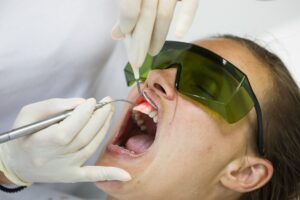
Join us as we explore the impact of dental trauma and how you can take control of your oral health and get your smile back.
Whether it’s an accident, sports-related injury, or even a simple fall, dental trauma can significantly impact your oral health and overall well-being. If left untreated, it may result in permanent damage, pain, or even tooth loss. Join us as we explore the impact of dental trauma and how you can take control of your oral health and get your smile back.
Types of Dental Trauma
Some of the most prevalent types of dental trauma include:
Tooth Fractures
This can include chips, cracks, or breaks in the tooth structure, ranging from minor enamel fractures to more serious damage involving the pulp or dentin (the inner, living part of the tooth).
Tooth Displacement
Displacement occurs when the tooth is pushed outward, inward, or sideways. It occurs when a tooth is completely or partially knocked out of its normal position, either through sudden or impact force.
Knocked-Out Tooth
The tooth is completely separated from its socket. Unfortunately, this would be considered a dental emergency and requires immediate attention.
Root Damage
Root fractures involve damage to the tooth’s root, which may occur at various levels, from the neck region to the tip of the root.
Injury to the Gum Tissues
Dental trauma can also impact the gums, the bone that holds the tooth or teeth in place, and the periodontal ligament that anchors the tooth to the bone. As a result, the person can receive lacerations, cuts, or bruising to the cheeks, lips, tongue, or other oral tissues.
Actions to Take After Dental Trauma
- Remain calm and examine the severity of the injury to determine if it’s a dental emergency, such as severe bleeding or a completely knocked-out tooth.
- If you notice bleeding, apply gently to the affected area using a gauze or clean cloth. Avoid rinsing or touching the injured area unnecessarily because this might cause further damage.
- If a tooth has been knocked out, gently pick it up by the visible part of the tooth and avoid touching the root. Attempt to preserve any displaced or avulsed tooth.
- Place a cold compress or ice pack to the impacted area to help minimize swelling and pain.
- Even if the injury appears minor, please contact a dentist or emergency dental clinic in Annapolis immediately. Prompt treatment for dental trauma is critical for the best possible outcome.
At the end of the day, protecting your smile and oral health is maintaining it before problems arise. So, stay proactive and keep that smile safe!
Transform Your Smile with Annapolis Dental Care
Whether it’s a regular check-up you need or a tooth extracted, your dentist in Annapolis is here to serve! Annapolis Dental Care has the expertise and compassion to work with you on improving your oral health. Your comfort and health are our top priorities, and so we go above and beyond to make our patients happy and give them the highest quality care. To set up an appointment today, please give us a call at 410-267-0766 or visit us online. For more oral health tips for you and your family, follow us on Facebook, Twitter, and YouTube! We are always looking for new patients, so if you live in Arnold, Annapolis, Anne Arundel County, MD, come on down!
